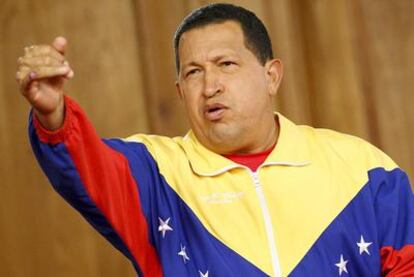Oil boom has not helped Venezuela
Chávez's runaway public spending used to strengthen nation's image abroad
Despite the massive windfall in petroleum profits in recent years, the Venezuelan government has failed to take advantage of the longest oil boom in its history. The government of Hugo Chávez is apparently running out of financial resources, and is increasingly relying on borrowing to grapple with runaway spending due in large part to uncontrolled and disorganized public-sector growth.
"We are sitting on a time bomb," says Leonardo Palacios, a Venezuelan expert on taxation and public finance. "The government has resorted to irresponsibly indebting itself, which will commit this and all future generations for years to come."
But the Chávez government says the country's public debt is "manageable" and is at an "appropriate" level.
In 2009, Venezuela's total debt was 36.35 percent of its total GDP, a hike from the 32 percent nine years earlier, IMF figures show. This year, the government has approved a new public debt law authorizing some 40.3 billion bolivars (about $9.3 billion dollars), with half of that amount going to fiscal expenditures.
Figures from the Ministry of Planning and Finance from the end of the third quarter last year show domestic public debt - bond issues, treasury bills and promissory notes to national banks to finance short-term public expenditure - amounted to 83.047 billion bolivars ($19.313 billion).
Within the decade from 2000, foreign debt rose from $21.727 billion to $36.847 billion, a 69.5-percent hike. Economist Orlando Ochoa told the Caracas daily El Mundo recently that even with oil priced at more than twice the amount set in the budget, "the surplus from sales is not enough to meet public expenditures," due to the problems the beleaguered country is facing in its export levels and collecting money for its products.
According to Palacios, Venezuela squandered most of its income by trying to pretend that it has not been affected by the global financial crisis.
With oil resources, which represent more than 90 percent of incoming revenue, the Chávez government financed power plants in Cuba, roads in Nicaragua and different infrastructure projects in Bolivia and Ecuador.
"The government's international commitments to try to win political support from some nations, and to give an image abroad that there is economic stability and that it has not suffered the crisis of capitalism, as well as the lack of genuine planning with oil revenues, do not address the real needs of the people," says analyst Leonardo Chirinos, who is secretary general for the Think Democracy party.
Venezuela, which has the highest rate of inflation in the South American continent - some forecasts place it at 28 percent this year - had to devalue its currency twice in 2010. Palacios said that he would not be surprised "that another devaluation is ordered to help bankroll public spending in the middle of this year."
And because Venezuelans face a general election next year, some analysts predict that Chávez intends to increase public spending to help win over voters to reelect him for another six-year term.
"Venezuela is no longer an investors' magnate. We cannot compete with emerging economies in Latin America. It is no longer a destination for fixed capital investment or for 'swallows' [short-term investments]," says Palacios.

Tu suscripción se está usando en otro dispositivo
¿Quieres añadir otro usuario a tu suscripción?
Si continúas leyendo en este dispositivo, no se podrá leer en el otro.
FlechaTu suscripción se está usando en otro dispositivo y solo puedes acceder a EL PAÍS desde un dispositivo a la vez.
Si quieres compartir tu cuenta, cambia tu suscripción a la modalidad Premium, así podrás añadir otro usuario. Cada uno accederá con su propia cuenta de email, lo que os permitirá personalizar vuestra experiencia en EL PAÍS.
¿Tienes una suscripción de empresa? Accede aquí para contratar más cuentas.
En el caso de no saber quién está usando tu cuenta, te recomendamos cambiar tu contraseña aquí.
Si decides continuar compartiendo tu cuenta, este mensaje se mostrará en tu dispositivo y en el de la otra persona que está usando tu cuenta de forma indefinida, afectando a tu experiencia de lectura. Puedes consultar aquí los términos y condiciones de la suscripción digital.








































